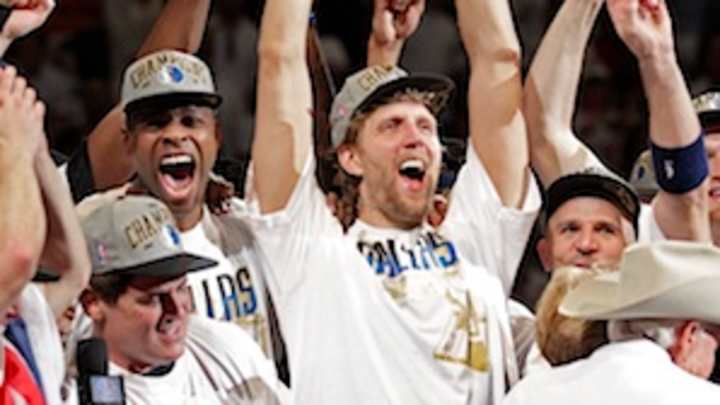My Sportsman: Dirk Nowitzki

Sports Illustrated will announce its choice for Sportsman of the Year on Dec. 5. Here's one of the nominations for that honor by an SI writer.
Was there any reason to believe Dirk Nowitzki would win the 2011 NBA Championship? If he were ever going to lead the parade, wouldn't he have been paraded by now?
Here is the long list of reasons why it wasn't likely to happen: He was 32 and in his 13th NBA season, placing him on the wrong side of the downward curve. Since taking a 2-0 lead in the 2006 NBA Finals, he and his Dallas Mavericks had lost 21 of 31 postseason games. Along that disastrous path they had suffered the most infamous postseason upset in league history, losing to the bottom-seeded Warriors after winning 67 games in Nowitzki's MVP year of 2006-07. Last season, they were without No. 3 scorer Caron Butler, who had been injured soon after Nowitzki had suffered a knee injury of his own in December. And they were widely picked as the team most likely to be upset in the first round -- a likelihood that grew stronger when the Mavs surrendered a 24-point lead that enabled the Trail Blazers to even that series at 2-2.
That's when Nowitzki made his stand. His Mavs went 14-3 over the remaining seven weeks, sweeping the defending champion Lakers and hijacking the NBA Finals from LeBron James and Dwyane Wade. It was the most inspiring run the league had seen in years. Nowitzki played with the command of a star who controls the tempo without appearing to be hurried. He led the Mavs back from deficits of 15 points with five minutes left in the Western Conference finals at Oklahoma City, and then scored the Mavs' last nine points to steal Game 2 of the NBA Finals at Miami. All the while, he never appeared to feel pressure, even though this may have been his last chance at a title.
In the Finals he overcame a torn tendon of his middle finger to win Game 2 with a left-handed spinner, and then overcame a fever to clinch Game 4 at the end. The only time he didn't appear to know what he should do was when the championship was won and he ran off the court in Miami, unable to contain his emotions and unwilling to make a scene -- an altogether unusual event in today's NBA.
His momentary exit was an invitation for others to imagine what could have made him so emotional, and it was another long list. As a teenager in Germany, he had no reason to believe he would become a 10-time NBA All-Star and future Hall-of-Famer, much the same as he had no reason to imagine he could win a title so late in his career. When he came to America as a 20-year-old in 1999 there was no precedent for anyone like him -- a young, European 7-footer who shot threes far more often than he posted up, thanks to the unique teachings of longtime counsel Holger Geschwindner. Over the years he would transform the NBA as the league sought poor-man versions of Nowitzki to space the floor from the three-point arc -- even as Nowitzki was working to improve his back-to-the-basket game, which helped enable his dominance of the 2011 playoffs.
The Mavs won with older players who appeared to be running out of hope, but they found hope in Nowitzki. In a season dictated by free agency, he was inspired by his relationship of loyalty with owner Mark Cuban, who inherited Nowitzki when he bought the team in 2000 and relentlessly sought a championship formula around his last original Maverick amid the painful departures of Michael Finley and Steve Nash and the negative feedback of so many playoff losses. It made for a timeless story of faith and perseverance, and now it makes Dirk Nowitzki my Sportsman of the Year.
